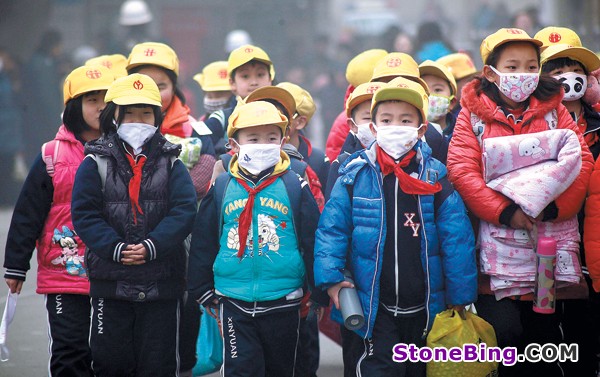
Primary school students in Jinan, capital of Shandong province, don masks amid heavy pollution and flu risks. Zheng Tao / For China Daily
Virus continues to spread as too few people opt to get vaccinated
Health specialists have urged more people to get flu shots this winter, as the killer virus continues to sweep the country.
Although influenza cases are "well within the normal range compared with last year", China's top health specialist Shu Yuelong warned that the number of people receiving vaccinations is still far lower than international levels, potentially putting lives at risk.
"Only about 2 percent of people on the Chinese mainland get flu shots each year," the director of the National Influenza Center, under the Center for Disease Control and Prevention, said on Tuesday.
A total of 360 cases of H1N1 flu were reported between Dec 1 and Jan 6, including two people in Beijing who died. Another person also perished from a different strain.
Shu warned that outbreaks will last into March, "which might mean more deaths, particularly among children and the elderly," the most vulnerable groups.
H1N1 and H3N2, the two most prominent flu strains this season, may have even claimed more lives, he said.
Due to the current system of reporting casualties, as well as limited laboratory facilities at many health institutions, "a number of fatal flu cases may have gone undetected and instead been attributed to secondary complications, such as heart failure," Shu added.
Wang Lin, director of healthcare and disease prevention at the China-Japan Friendship Hospital in Beijing, said the number of people making appointments for shots had increased slightly.
The situation was different at the hospital's international medical unit, though, according to its director, Zhu Yuqing.
"We get about two or three foreigners coming for flu shots each day, similar to past years," she said.
And according to He Xiong, deputy director of the Beijing Center for Disease Control and Prevention, many clinics offering the vaccine in the capital had stopped giving shots due to a lack of demand.
He said about 1.7 million residents had received flu shots this winter, mostly elderly people and students.
Deng Haihua, spokesman for the Ministry of Health, said the flu virus had not mutated and "vaccines provide good protection from H1N1, H3N2 and the influenza B strain".
Health specialists added that vaccines also help counter the severity of other illnesses, such as pneumonia, brought on by the flu.
Vaccination costs may be a factor.
Flu shots come under the second category in the government's immunization plan, and this means that people in some areas have to pay more than 100 yuan ($16) for an imported variety of the vaccine.
Shu urged the government to cover the expense to help boost vaccinations.
Beijing has given free flu shots to the young and elderly since 2011 and that helped boost inoculation rates among the elderly to 75 percent and 50 percent for the young.
Because of this, the chances of an outbreak occurring here similar to what they are seeing in the US have been greatly reduced, said He, from the Beijing center.
At present, the US is experiencing its worst flu season since 2009. Many states reported vaccine shortages.
The World Health Organization estimates that flu kills 250,000 to 500,000 people worldwide each year.







